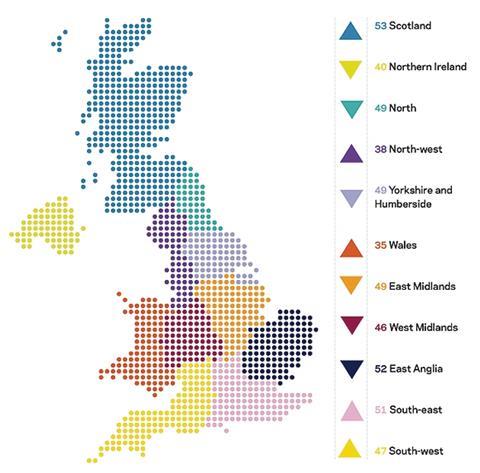Construction workload is expected to keep falling over the next three months, but the pace of decline should begin to ease, according to Experian Marketing Information Services
01 / The state of play
Construction activity continued to fall in August - a fourth successive monthly decline, after being briefly in expansion territoryin April. Moreover, the index declined by three points to its lowest level since last November.
Activity fell across all three sectors, with the residential index at its lowest level for 16 months. However, the non-residential activity index remained unchanged for the third successive month at 48, while the civil engineering index edged up by one point to a four-month high of 48. A figure above 50 indicates an increase in activity, and one below, a decrease.
Less than a quarter of respondents reported no constraints on activity in August, the lowest proportion since March - but there was a 5% drop in the percentage of firms indicating that insufficient demand was constraining their activity - from 57% in the previous month to 52%.
Firms continued to report that order books were below normal for the time of year, highlighted by the orders index remaining unchanged at 45.
Residential and civil engineering order books were again below normal for the season. By contrast, the non-residential orders index remained in positive territory at 56, unchanged from July’s figure, and indicating higher than normal order books for the time of year.
The outlook for construction employment continues to be very downbeat, with the employment index posting 35 in August, a one-point decline on the previous month. The index has been below 50 since December 2007.
02 / Leading construction ativity indicator
CFR’s Leading Construction Activity Indicator suggests that construction workloads will continue to decline over the next three months. However, the pace of contraction is expected to have slowed in September and will ease again in November.
The indicator uses a base level of 50: a figure above that level indicates an increase in activity, below that level a decrease.
![]()
03 / Material costs
![]()
In August, about 14% of building firms reported that materials costs had fallen from a year earlier, unchanged from three months ago. Almost 10% indicated that annual material cost inflation was between 0 and 2.5%, while 40% saw materials costs rise by 5.1 and 7.5%.
The proportion of building firms reporting annual material cost inflation of more than 7.6% was 29%, significantly higher than the 22% of three months ago.
More than half (56%) of civil engineering firms reported that material costs had risen between 2.6 and 5% from a year earlier, unchanged from three months ago. The proportion reporting material cost deflation increased from 17% three months ago to 22% in August.
04 / Regional perspective
Experian’s regional composite indices incorporate current activity levels, the state of order books and the number of tender enquiries received by contractors to provide a measure of the relative strength of each regional industry.
Five of the 11 indices for the regions and devolved nations rose in August. Scotland saw the strongest increase as its index rose seven points to an eight-month high of 53. This made it the best performing across the UK as a whole. The index for the North-west increased by three points to 38, its highest reading for four months, but was still significantly negative.
The South-east’s index rose by two points to 51, taking it into positive territory for the first time since September last year. There wereone-point rises for the South-west and Wales, taking the indices to 47 and 35 respectively. However, Wales’ index remained the most negative across the UK.
Yorkshire and Humberside recorded the largest fall, with its index dropping six points to 49, taking it back below 50 for the first time in five months. The East Midlands and the North both saw their indices decline by three points to 49. The index for East Anglia fell two points but remained in positive territory at 52.
The index for the UK, which includes firms working in five or more regions, rose by one point to a 29-month high of 58.

This an extract from the monthly Focus survey of construction activity undertaken by Experian’s Marketing Information Services division on behalf of the European Commission as part of its suite of harmonised EU business surveys. The full survey results and further information on Experian Marketing Information Services’ forecasts and services can be obtained by calling 020 7746 8217 or logging on to www.experian.co.uk/economics
The survey is conducted monthly among 800 firms throughout the UK and the analysis is broken down by size of firm, sector of the industry and region. The results are weighted to reflect the size of respondents. As well as the results published in this extract, all of the monthly topics are available by sector, region and size of firm. In addition, quarterly questions seek information on materials costs, labour costs and work-in-hand.

























No comments yet